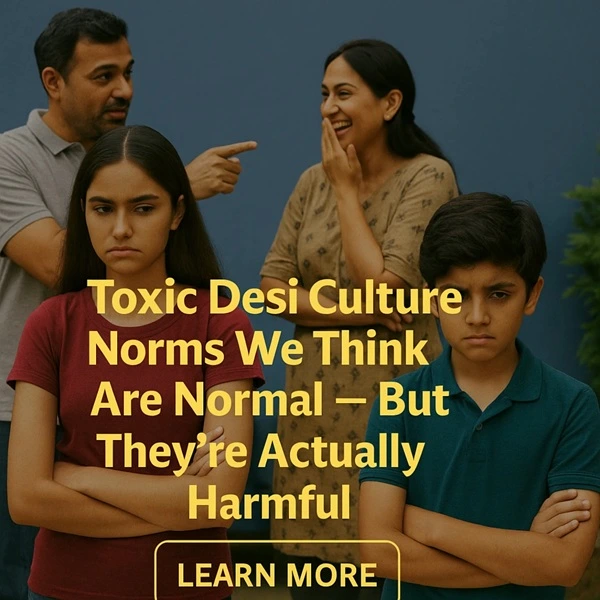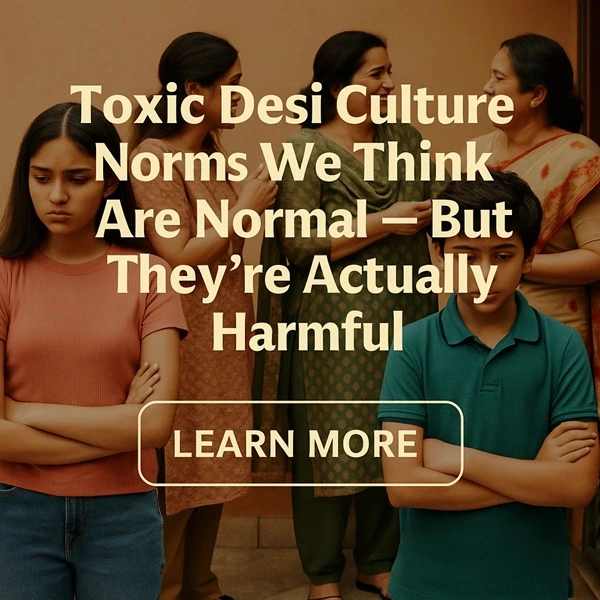“Arre log kya kahenge?”
“Shaadi ke baad sab theek ho jayega.”
“Beta, compromise toh karna padta hai.”
These sentences might sound familiar, almost comforting to some. But dig a little deeper, and you’ll find they are loaded with centuries of internalized toxicity, social conditioning, and emotional neglect that our Desi culture has conveniently brushed under the carpet. We’ve normalized these things so deeply that questioning them often makes us seem like the rebellious outliers.
It’s time we take a hard look at the patterns we’ve mistaken for tradition and the trauma we’ve packaged as “values.”

Some of The Toxic Desi Culture Norms Are :
1. Shaming Mental Health Issues
Talking about anxiety, depression, or therapy still makes people in many Desi households uncomfortable.
You’re often told to:
- Pray more
- Keep yourself busy
- Stop overthinking
Why it’s toxic: It invalidates real mental health struggles. Rather than treating them as legitimate illnesses, we dismiss them as mood swings or weakness.
Normalized phrase: “Hamaare time mein koi depression nahi hota tha”
Reality check: Depression existed. It was just silenced.
2. Glorifying Sacrifice — Especially for Women
From the moment a girl is born, she is taught to give up for her parents, her husband, her in-laws, her children.
Why it’s toxic: The glorification of self sacrifice denies women the right to dream, be ambitious, or even take care of themselves.
Normalized behavior:
- A daughter-in-law who eats after everyone else
- A woman leaving her job post marriage because “ghar zyada zaroori hai”
Reality check: Sacrifice should be a choice, not a gendered obligation.
3. Toxic Parenting in the Name of “Discipline”
Indian parenting often borders on emotional manipulation:
- Constant comparisons (“Sharma ji ka beta dekho!”)
- Guilt tripping (“Sab kuch tumhare liye kiya, aur tum yeh kar rahe ho?”)
- Beating as a form of “love”
Why it’s toxic: It creates adults with people pleasing behavior, low self worth, and deep rooted anxiety.
Normalized phrase: “Maar kha kar hi toh insaan banta hai”
Reality check: Abuse isn’t character building.
4. Obsession with Marriage (Over Everything Else)
In many Desi households, marriage is the ultimate goal.
It doesn’t matter if you’re unhappy, unprepared, or unsure, just get married.
Why it’s toxic:
- It creates social pressure that ruins lives
- Reduces human worth to marital status
- Traps many in toxic or abusive relationships due to stigma around divorce
Normalized dialogue:
“Umar nikal rahi hai.”
“Log kya kahenge agar ladki ghar pe baithi hai?”
Reality check: Marriage isn’t a deadline, it’s a lifelong decision.
5. Body Shaming & Colorism
You could be:
- Too dark
- Too fair
- Too skinny
- Too fat
And someone from your family will always have an unsolicited opinion.
Why it’s toxic:
It messes with self image from a young age. Especially for women, the “fair and lovely” standard still dictates “beauty” and marriageability.
Normalized phrases:
- “Thoda weight kam karo shaadi se pehle”
- “Kitni kali ho gayi ho”
Reality check: Beauty isn’t defined by skin tone or size.
6. Normalizing Domestic Abuse & Silence
Domestic violence is often brushed off with:
- “Ghar ke maamle ghar mein hi suljhao”
- “Thoda bardasht karo”
Why it’s toxic: Silence becomes survival, and survival becomes a “virtue.”
What’s normalized:
- Emotional manipulation
- Physical abuse
- Financial control
Reality check: Suffering in silence isn’t sanskaar.
7. Patriarchal Inheritance of Responsibility
Why is it only the daughter-in-law’s job to take care of aging in-laws?
Why must the son be the only bearer of the family name?
Why it’s toxic:
It assumes that love, care, and responsibility are gender bound.
Normalized belief:
“Beti toh paraya dhan hoti hai.”
Reality check: Relationships are emotional, not transactional.
8. Career Choices are Family Decisions
Your life path must align with your family’s prestige, not your passion.
- Engineering or medicine? Great
- Arts, dance, photography, or music? “Yeh toh hobby hai.”
Why it’s toxic:
It kills creativity and pushes people into unfulfilling careers, leading to burnout and depression.
Normalized dialogue:
“Log kya kahenge agar tum yeh karoge?”
Reality check: Success has no one size fits all blueprint.
9. Normalizing Gossip and Toxic Relatives
Gossip is treated like bonding in many Desi families.
Judging cousins, mocking neighbors, and digging into someone’s personal life has become a social sport.
Why it’s toxic:
It fosters jealousy, breaks relationships, and ruins mental peace.
Normalized comment:
“Kya tumne suna ki Sharma ji ki beti bhag gayi?”
Reality check: Other people’s lives aren’t your entertainment.
10. Suppressing Individuality in the Name of Respect
If you question elders, you’re “rude.” If you set boundaries, you’re “selfish.”
Why it’s toxic:
Respect in Desi culture is often one sided and age based, not mutual.
Normalized behavior:
- No personal space
- Expectation to agree with everything
Reality check: Respect should be earned, not demanded.
11. We Struggle to Celebrate Others Doing Well
Let’s be brutally honest—many of us were raised in environments where someone else’s success felt like our failure.
A classmate scores more marks?
A cousin gets a better job offer?
A friend buys a new car or house?
Instead of celebrating their wins, we get uncomfortable. We start comparing, questioning, even doubting their worth:
“Kaise le liya itni mehengi gaadi?”
“Sharma ji ka beta toh sirf dikhata hai social media pe.”
Why it’s toxic:
This culture of constant comparison eats away at our ability to feel content. It creates a mindset where our happiness depends on others doing less than us not more.
We end up measuring success not by our growth, but by how far “ahead” we are of others. This is not competition, it’s insecurity dressed as ambition.
Reality check: True confidence comes from clapping for others, even when you’re still waiting for your moment.
12. Friendship Between Boys and Girls Is Still Treated Like a Taboo
In many Desi families, if a boy and girl are friends, eyebrows are raised before you even say “hello.”
- Parents start asking, “Kya rishta hai?”
- Aunties whisper, “Itna close dosti? Kuch toh hoga.”
- And society assumes it must be romantic.
Why it’s toxic:
It discourages healthy, platonic relationships between men and women. It breeds shame, secrecy, and unnecessary drama.
Worse? It teaches young people that friendship is only allowed within gendered boundaries, which stunts emotional growth and reinforces gender stereotypes.
And no—your daughter having a male best friend does not mean she’s “getting out of control.” It means she’s human.
13. Boys Are Raised as Lifelong Providers, While Girls Are Treated as Temporary Guests
From a very young age, boys are told:
“Tumhe toh maa-baap ka dhyan rakhna hai jab bade ho jaoge.”
“Tum ghar ka naam roshan karoge.”
Meanwhile, girls hear:
“Shaadi ke baad toh beti parayi ho jaati hai.”
“Ladkiyaan apne sasuraal ka ghar hoti hain.”
Why it’s toxic:
This conditioning creates emotional pressure on boys to suppress their own dreams for the sake of duty—and on girls to never feel truly “at home” in their own homes.
It builds guilt in sons if they ever want to move out or live independently. And it leaves daughters feeling like they’re guests waiting to leave.
This isn’t “tradition”—this is emotional inequality.
Reality check: Responsibility, care, and love should be shared, not assigned by gender.
A daughter can take care of her parents too. A son can choose personal freedom without being called “selfish.”
Love doesn’t have a script—it has understanding.
NOTE : For more such Lifestyle Posts, Follow Popnewsblend.com.

Hi, I’m Prashant Jain — a curious soul, storyteller, and content creator at heart.I’ve always been drawn to the world of entertainment, travel, sports, health & lifestyle — not just as a writer, but as someone who genuinely lives these experiences. Whether I’m binge-watching the latest OTT series, exploring offbeat spiritual destinations in India, or diving deep into wellness routines and cricket match insights, I love sharing what I discover with like-minded readers.
PopNewsBlend is my way of blending personal journeys with meaningful stories — ones that inform, inspire, and keep you ahead of the curve. Everything I write comes from real observations, hands-on experiences, and a deep passion for understanding the world around us.
Discover more from Popnewsblend
Subscribe to get the latest posts sent to your email.







